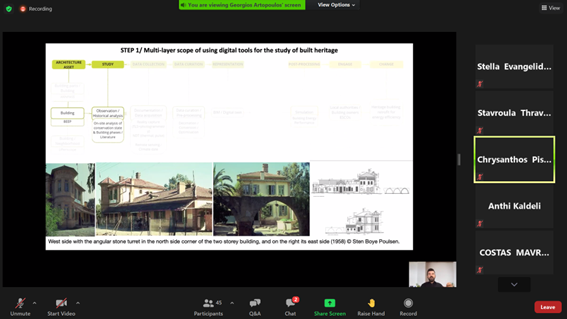
From: To:
BEEP at the Biennial of Architectural and Urban Restoration
The Cyprus Partner, The Cyprus Institute (CyI), presented the paper “Data-Driven Integrated Practices for the Study and Protection of Built Heritage” at the 5th Biennial of Architectural and Urban Restoration, BRAU5, organised by CICOP Italy, on 24 April 2021.
Historic urban environments are not given static formations disconnected from the contemporary fabric of a city, but rather a set of tangible and intangible assets subjected to dynamic pressures of economic, environmental, and social activities. The sustainable development of such environments is often threatened by urbanization, financial crises, gentrification, and migration phenomena. The cross- disciplinary nature of the pressing challenges posed by these phenomena requires the development of novel data-driven tools for social resilience, inclusion and safeguarding. Responding to this need, the Virtual Environments Lab (VELab), at the Cyprus Institute, is developing and implementing data- driven practices and tools, tested and validated in an ENI CBC MED funded project. The aim of this activity is to advance the study of built heritage, in order to safeguard its continuous use by promoting the engagement of local communities and built asset key stakeholders through the utilisation of an integrated suite of digital tools.
BEEP was presented as part of the research activities conducted by the Cypriot partner, and was received by the wide audience of the conference with great interest. The conference was co-organised by:
CICOP Net Brazil and University of San Paolo, Brazil CICOP Net Egypt and ANPIEMED Cultural Association, Egypt ICOMOS, Cyprus CICOP Net B&H and University of Sarajevo, Bosnia & Herzegovina CICOP Net Delegation in France CICOP Net Greece CICOP Net Pakistan. This support enabled the event to be presented between 7 and 25 April in all respective countries (I.e., Brazil, Egypt, Bosnia & Herzegovina, Greece, France and Pakistan) which offered wide visibility to BEEP.
About the BEEP project:
BEEP project aims at strengthening the use of Building Information Modelling (BIM) to enhance energy efficiency in buildings. The testing of this emerging technology on built heritage will be performed to demonstrate its scalability to the entire building stock. The project will provide public administrations with a powerful method for the energy rehabilitation of public buildings to be supported with private funds through the Energy Performance Contracting (*). The project main outcome will be an innovative methodology based on the integration of emerging technologies tested on 9 heritage public buildings located in Italy, Spain, Cyprus, Jordan, Palestine, Lebanon, and Egypt.
(*) Energy performance contracting (EPC) is a mechanism for organising the energy efficiency financing. The EPC involves an Energy Service Company (ESCO) which provides various services, such as finances and guaranteed energy savings. The remuneration of the ESCO depends on the achievement of the guaranteed savings. The ESCO stays involved in the measurement and verification process for the energy savings in the repayment period. ESCO and energy performance contracting are mostly found in the public sector and to a lesser extent in the industrial and commercial building sectors (Hilke and Ryan, 2012). Source: European Comission.









